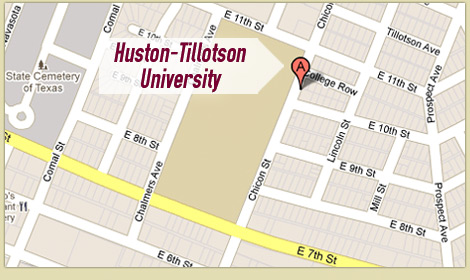
Assessment
Welcome to the OIPRA Assessment Page!
Assessment is key to understanding and improving the University’s effectiveness in all areas. Institutional effectiveness is the process of gathering and analyzing data to make informed decisions that ensure Huston-Tillotson University is meeting its intended outcomes. The Office of Institutional Planning, Research, & Assessment (OIPRA) facilitates this process.
Assessment at HT takes place at all levels of the institution. In the area of instruction, Program-level Student Learning Outcomes (PSLOs), Core Competencies, and Course-level Learning Outcomes are assessed. Based on results of assessments and other data (both qualitative and quantitative), adjustments and action strategies are made (as appropriate) in such areas as curricular/course content, instruction, evaluation, student support efforts, etc.
This information also guides the departments’ planning of longer-term goals. All of a discipline’s PSLOs should be assessed within a three-year period. Huston-Tillotson University’s assessment process aligns with the Institution’s mission statement and strategic plan.
Student Learning Outcomes
To have meaningful assessment, it is necessary to have well-defined student learning outcomes (SLOs). The SLOs are the key skills, knowledge, habits, or attitudes towards which the curriculum is focused.
NOTE: There is a distinction between…PSLOs & CSLOs
- PSLOs (Program-level Student Learning Outcomes) – What a student learns/masters upon matriculating through a program.
- CSLOs (Course-level Student Learning Outcomes) – What a student should learn/master within a particular course.
For external reporting purposes, we focus on PSLOs.
PSLOs- Outcomes are measurable descriptions of the intended results of student learning [Karel, 2008]. When defining outcomes, it is important to:
• Identify what learning is the most important, often bringing together several parts of the curriculum.
• State the expectations of student performance, what level of expertise or mastery the students are expected to achieve at the end of the course or program.
• Describe what the student can do, allowing measurement of demonstrable activity.
• Focus on lasting results, that will remain relevant long after the course is completed and the student has graduated.
In general, student learning outcomes (SLOs) fall into several categories [Suskie, 2018, p. 45]:
• Knowledge of facts and concepts
• Cognitive skills
• Performance skills
• Attitudes and values, the principles that help guide our lives
• Habits of mind, the personality traits that define our character
National Institute for Learning Outcomes Assessment: Transparency Framework
For HT FACULTY & STAFF:
To enter assessment or planning information into SPOL, click the link below:
HT’s 4 CORE COMPETENCIES
All Huston-Tillotson University students are to demonstrate, through various assessments, the following 4 core competencies:
- Critical and Creative Thinking, Scientific and Quantitative Reasoning
The ability to think logically, critically, and creatively: to generate ideas, to interrogate, to analyze, to evaluate ideas, to employ scientific and quantitative reasoning, and to identify problems, propose solutions, and to assess the effectiveness of solutions. The ability to evaluate beauty in nature and in human culture, particularly in the arts. The ability to analyze and assess information sources.
- Communication and Human Expression
The ability to create, send, receive, and understand verbal, visual, and written messages competently in public, technologically mediated, group, and interpersonal contexts. The ability to use multimedia tools to gather, analyze and convey information. The basic ability to communicate in another language. The ability to select and employ terminology, genres and styles appropriate for specific contexts. The basic ability to express aesthetic perceptions effectively and to communicate and express oneself in an artistic medium.
- Ethics, Social Justice, and Cultural Diversity
Awareness, appreciation, and respect for diverse peoples, cultures, and historical periods, both in the United States and around the world. The development of a personal foundation for ethical Huston-Tillotson University Undergraduate Bulletin 2021-2022: Volume VI – Page 80 decision making and moral integrity, with knowledge of diverse ethical systems. Knowledge of the interrelationship between self, society, and environment. Knowledge of historical and contemporary social issues, especially those of African Americans and other peoples of color.
- Practical, Spiritual, and Experiential Development
Knowledge and skills learned through practice, experience and application. The development of mental, emotional, spiritual, and physical well-being through reflection and practice. Learning through participation in laboratories, arts, and cultural activities, athletic activities, self-examination and life-skill experiences.
HUSTON-TILLOTSON UNIVERSITY ASSESSMENT SYSTEM




